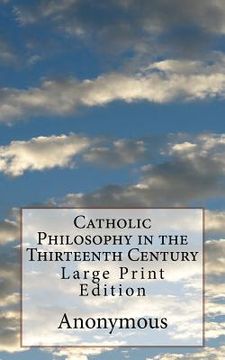Reseña del libro "Catholic Philosophy in the Thirteenth Century: Large Print Edition (en Inglés)"
Excerpt: The errors of the present day are generally the consequences of some false principle admitted long ago, and many may be traced clearly to the calamities of the sixteenth century. One of these is, that the mediaeval learning preserved (as was declared at the Council of Trent) chiefly among the monks was in its nature useless and trifling, fitted only to amuse ignorant and narrow-minded men in the darkness of the middle ages, and consisted in certain metaphysical speculations and logical quibbles, called scholastic teaching. Several French writers have done much to disabuse men of this prejudice, by making known the amount of knowledge and science attained by mediaeval scholars, whose works are despised because they are too scarce to be read, and perhaps too deep to be understood in a less studious age. One of these champions of he truth is Ozanam, who has traced with a master-hand the preservation of all that was valuable in antiquity, through the downfall of the empire; and he has rendered a subject which otherwise it would have been presumption to approach a plain matter of history, which the reader has only to receive, like other facts; so that we see how, under the safeguard of the Church, the same powers which were formerly used in vain by the philosophers for the discovery of truth, were successfully used for the attainment its deeper mysteries. But all that is human is marked by imperfection; and the very instinct which led philosophers to "feel after" their Creator, and seek that supreme good for which we were created, was misled by errors which all ultimately ended in infidelity. It is not necessary to dwell on these. A few words will remind the classical scholar that the Ionian school, which sought truth by experiment, through the perception of the senses, leads to fatalism and pantheism; while Pythagoras, who sought by reason and the sciences him who is above and beyond their sphere, left the disappointed reason in a state of doubt and indifference, or else despair. Plato alone pursued a course of safety. Taking the existence of God as a truth derived perhaps from patriarchal teaching, he used the Socratic method of induction only for the destruction of falsehood, and received with fearless candor all that the poets taught of superhuman goodness and beauty; for though the symbolism of the poets degenerated into disgusting idolatry, they have been called the truest of heathen teachers. It is well known how Aristotle strengthened the reasoning power; but the mighty power had no object on which to put forth its strength, and the more noble minds rejected at once both reasoning and experiment, and sought for religion in the mysticism of Alexandria. Such was the wreck and waste of all that man could do without revelation, and so sickening was the disappointment, that St. Augustin would fain have closed the Christian schools to Virgil and Cicero, which he loved once too well; but St. Gregory, brought up as he was a Roman and a Christian, had nothing to repent of or to destroy, and classic letters were preserved by Christians.

